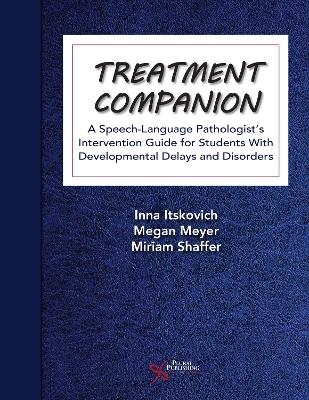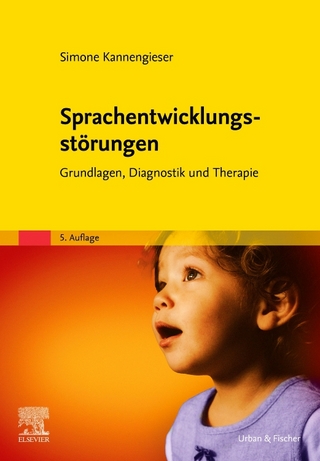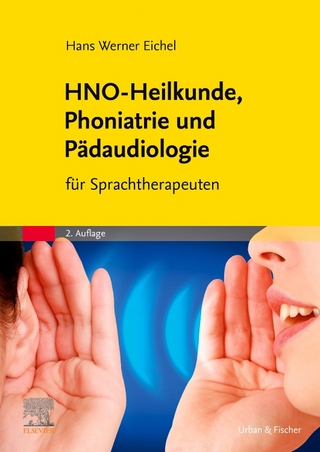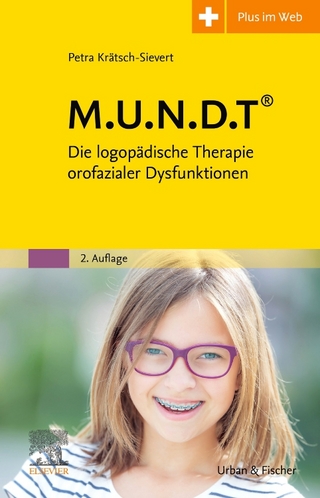
Treatment Companion
Plural Publishing Inc (Verlag)
978-1-63550-481-1 (ISBN)
Whether you’re working with a new student and don’t know where to begin, or you have a long-term client and you’re feeling stuck, Treatment Companion: A Speech-Language Pathologist’s Intervention Guide for Students With Developmental Delays and Disorders provides ideas and strategies for a variety of common language goals. Speech-language pathologists (SLPs) often face the challenge of adapting interventions to meet the needs of students with severe or complex disorders and diagnoses. As seasoned clinicians, the authors fuse their real-world experience with up-to-date research to create a robust road map for customizing SLP intervention strategies.
User friendly and straightforward, the Treatment Companion offers a conversational approach to identifying options and goals that meet students where they are, whether they are visual or kinesthetic learners, oral speakers or AAC users, engaged or distracted, from birth to age 21. With easy-to-navigate headings, examples, and visuals, this guide can be consulted on an as-needed basis. The suggestions and strategies are accessible and innovative, often not requiring any specialized supplies to implement.
The Treatment Companion offers both novice and experienced clinicians a valuable tool to support their clients in achieving the highest level of communication possible.
Inna Itskovich, MS, CCC-SLP, TSSLD has been working in the field of speech-language pathology, servicing the needs of students with developmental delays and disabilities, since 2011. She currently works in an elementary school setting. Inna has received extensive training in the area of literacy, specifically the Orton Gillingham approach for the remediation of reading and writing. Inna is also well versed in various augmentative and alternative communication (AAC) systems that focus on motor planning. She is ardently interested in the areas of expressive communication focused on narrative development. Inna is currently working in conjunction with various universities in helping to train student clinicians in the field to help bridge the gap and to facilitate language for students with special needs. ***** Megan Meyer, MS, CCC-SLP, TSSLD, ASL Ext has worked with preschool to high school age students since 2012. She has worked with children with various diagnoses including autism, Deaf/Hard of Hearing (DHH), and developmental delays and disabilities. Her primary area of interest is the Deaf/Hard of Hearing population and using both American Sign Language (ASL) and spoken English to build language and communication skills. Megan feels strongly that all children deserve to learn language in an accessible and effortless way. ***** Miriam (Miri) Shaffer, MS, CCC-SLP, TSSLD-BE has been working in elementary schools with children who have developmental delays and disorders, including autism and cerebral palsy. She is passionate about augmentative and alternative communication (AAC) and making sure that every child has a way to communicate. This includes training staff and family members in their child's communication device and how to facilitate communication throughout the day. She is also an advocate of teaching literacy skills to all children, no matter the perceived obstacles. She feels the greatest pride when she witnesses her students initiating communication and advocating for themselves independently.
Preface
Acknowledgments
About the Authors
Reviewers
I. Introduction: How to Use the Treatment Companion
Before You Begin
Where to Begin/Choosing Goals
Aligning to the Common Core State Standards
Targeting Goals
Steps Toward Mastery
Activities in Treatment
References
II. What You Need to Know
General Guidelines
Meeting a Student for the First Time
Developmental Hierarchy
Assessment
Progress Monitoring
Prompt Hierarchy
Modeling Appropriate Communication
Student Factors Affecting Treatment
Echolalia
Perceived Negative Behavior
Deaf/Hard of Hearing (DHH)
Augmentative and Alternative Communication (AAC)
Physical Disabilities
Bilingualism and Multiculturalism
Helpful Tips
Building Relationships With School Staff and Parents
Setting Yourself Up: Organization
Suggestions of Supplies, Books, Toys, and Games
References
III. Level I
Speech, Manual Signs, or Aided AAC?
Speech
Unaided AAC
Aided AAC
Note About the Goals in Level I
Attention to Modeling
Steps Toward Mastery
Activities in Treatment
Exploring
Steps Toward Mastery
Activities in Treatment
Five-Word Vocabulary
Steps Toward Mastery
Activities in Treatment
10-Word Vocabulary
Steps Toward Mastery
Activities in Treatment
20-Word Vocabulary
Steps Toward Mastery
Activities in Treatment
50-Word Vocabulary
Steps Toward Mastery
Activities in Treatment
References
IV. Level II
Two-Word Utterances
Steps Toward Mastery
Activities in Treatment
Actions
Steps Toward Mastery
Activities in Treatment
Three-Word Utterances
Steps Toward Mastery
Activities in Treatment
Expanding Vocabulary
Steps Toward Mastery
Activities in Treatment
Sentences in Present Tense
Steps Toward Mastery
Activities in Treatment
Concrete Simple Wh- Questions
Steps Toward Mastery
Activities in Treatment
Conceptual Simple Wh- Questions
Steps Toward Mastery
Activities in Treatment
References
V. Level III
Possessive ’s
Steps Toward Mastery
Activities in Treatment
Prepositions
Steps Toward Mastery
Activities in Treatment
Pronouns
Steps Toward Mastery
Activities in Treatment
Past Tense Verbs
Steps Toward Mastery
Activities in Treatment
Attributes
Steps Toward Mastery
Activities in Treatment
Grammatical Sentences
Steps Toward Mastery
Activities in Treatment
Yes and No Questions
Steps Toward Mastery
Activities in Treatment
Short Narrative
Steps Toward Mastery
Activities in Treatment
Simple Problem Solving
Steps Toward Mastery
Activities in Treatment
References
VI. Level IV
Introduction to Complex Wh- Questions
Complex Wh- Questions: Why Questions
Steps Toward Mastery
Activities in Treatment
Complex Wh- Questions: When Questions
Steps Toward Mastery
Activities in Treatment
Complex Wh- Questions: How Questions
Steps Toward Mastery
Activities in Treatment
Introduction to Detailed Narrative
Detailed Narrative: Story Grammar Markers
Steps Toward Mastery
Activities in Treatment
Detailed Narrative: Narrative Recall and Retell
Steps Toward Mastery
Activities in Treatment
Detailed Narrative: Sequencing
Steps Toward Mastery
Activities in Treatment
Introduction to Verbal Analogies
Verbal Analogies: Categories
Steps Toward Mastery
Activities in Treatment
Verbal Analogies: Object Function
Steps Toward Mastery
Activities in Treatment
Verbal Analogies: Synonyms and Antonyms
Steps Toward Mastery
Activities in Treatment
Verbal Analogies: Associations
Steps Toward Mastery
Activities in Treatment
Introduction to Figurative Language
Figurative Language: Idioms
Steps Toward Mastery
Activities in Treatment
Figurative Language: Multiple Meaning Words
Steps Toward Mastery
Activities in Treatment
Compound and Complex Sentences
Steps Toward Mastery
Activities in Treatment
Identifying the Problem
Steps Toward Mastery
Activities in Treatment
Identifying the Cause/Making Inferences
Steps Toward Mastery
Activities in Treatment
References
Appendix: Demystifying Augmentative and Alternative Communication
What You Need to Know About AAC
The Right to Communicate
What Does AAC Include?
Dispelling Common Myths About AAC
Communicative Competence
Comprehensive Assessment Leads to Comprehensive Intervention
Choosing Words to Target
Fostering Collaboration
Training
Creating a Culture of AAC
References
Index
| Erscheinungsdatum | 11.01.2024 |
|---|---|
| Verlagsort | San Diego |
| Sprache | englisch |
| Maße | 216 x 279 mm |
| Themenwelt | Medizin / Pharmazie ► Gesundheitsfachberufe ► Logopädie |
| ISBN-10 | 1-63550-481-3 / 1635504813 |
| ISBN-13 | 978-1-63550-481-1 / 9781635504811 |
| Zustand | Neuware |
| Haben Sie eine Frage zum Produkt? |
aus dem Bereich


